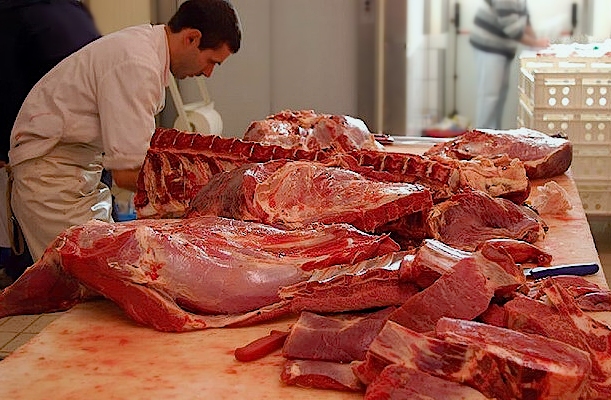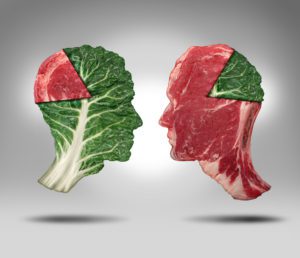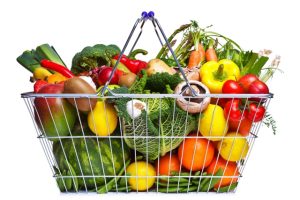When I tell people that I teach a health and wellness bible study, one of the first questions I am asked is, “Are you a vegetarian?” as if being a vegetarian is some kind of occult practice they want to avoid. I am not a vegetarian; however, I do believe that we should limit or eliminate the amount of animal protein we intake. Recent research continues to show that a plant-based protein diet makes us healthier and increases our lifespan, whereas a high meat diet increases the risk of dying. These findings further suggest that as we age, we should make changes in our diet and lifestyle.
Associations between Animal Protein and Mortality
For example, a study published by Cell Metabolism recommended that aging adults should make adjustments to their protein intake. When the researchers, Levin et al, examined the link between animal protein and the risk of dying, they discovered that “respondents aged 50–65 reporting high protein intake had a 75% increase in overall mortality and a 4-fold increase in cancer death risk during the following 18 years.“ If we were to put this study in perspective, high intake of animal protein in middle age is as deadly as smoking cigarette, which is associated with 70% or higher of all-cause mortality rates, particularly in men. The animal protein study also showed that after 18 years cancer death risk quadrupled. But when plant derived protein was consumed, these associations were diminished or decreased dramatically.
On the other hand, respondents 65 or older, showed changes that were the opposite to the middle-aged group. High intake in the older group resulted in reduced cancer and a longer lifespan.
A “low protein diet was detrimental in the very old,” states the report.
The Application of the Study
A plant-based protein diet continues to trump an animal protein diet in preventing diseases, such as cancer. Aiming to consume green vegetables, beans and other legumes, and seeds that are rich in plant protein and which have cancer-preventive, not cancer-promoting properties will help to improve our health and longevity, according to Dr. Fuhrman. Young people are not immune from cancer death risks either, which are now becoming evident in this age group. It is important to note that both test groups in the report are susceptible to developing diabetes whether they ingest high or low quantities of protein.
However, the need for high protein intake in adults 65 or older could be because of sarcopenia, a disease that is associated with loss of muscle mass and strength as a result of aging. Protein stimulates the production of growth hormone along with resistance or strength training. It is the growth hormone which promotes muscle increase and thus strength.
Making Changes to Lifestyle
Hence, the study “suggests that low protein intake during middle age followed by moderate to high protein consumption in old adults may optimize healthspan and longevity.” Being aware of the changes in our bodies is important in making these necessary modifications in our diets. No doubt our bodies need protein. If you’re like me, you may want to make these changes gradually, reducing protein consumption that is not plant-based. Non-plant proteins include red meat, fowls, fish, diary, and some protein powder.
In the Bible, the story of Daniel and his friends points to significant evidence of the healing powers of plants, which are living. When captured by the king of Babylon, Daniel and his friends were ordered to eat the king’s meat and wine in order to prepare them for service. Daniel made a bargain with those in authority. Because the Israelites were given specific instructions regarding their food preparation, particularly regarding meat, Daniel wanted to honor God by not consuming the king’s delicatessen, which was not ‘kosher’. Instead Daniel asked that he and friends eat all vegetables for 10 days. Daniel and his friends were allowed to consume only vegetables for the specified time set out. At the end of the 10th day, Daniel and his friends were healthier physically, mentally and spiritually than even the king’s men on meat. Like Daniel and his friends, we should seek to honor God, too, in what we eat.
References:
Levine ME; Suarez JA; Brandhorst S; Balasubramanian P; Cheng CW; Madia F; Fontana L; Mirisola MG; Guevara-Aguirre J; Wan J; Passarino G; Kennedy BK; Wei M; Cohen P; Crimmins EM; Longo VD. “Low Protein Intake Is Associated with a Major Reduction in IGF-1, Cancer, and Overall Mortality in the 65 and Younger but Not Older Population,” Cell Metabolism, 2014: 19 (3).
https://archive.cdc.gov/www_cdc_gov/tobacco/sgr/50th-anniversary/index.htm
https://www.drfuhrman.com/library/Animal_protein_IGF-1_colon_cancer.aspx






